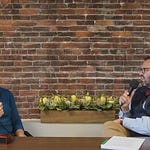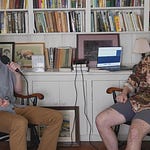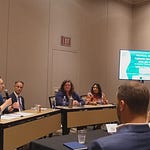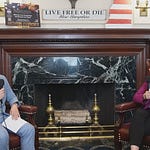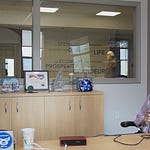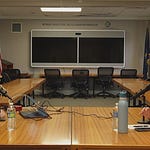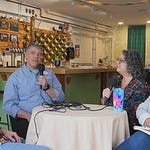This is Maggie.
She’s a member of the U.S. House of Representatives, former naval intelligence officer, a constitutional scholar, and an unapologetic optimist.
In this episode, Congresswoman Maggie Goodlander brings us inside the halls of power—and back to the heart of New Hampshire. She shares how being born on Election Day, raised by a legislator mom and a liberty-loving dad, and serving 11 years in the Navy shaped her belief that public service is both imperfect and essential.
From working across the aisle to pass her first veterans’ bill, to knocking on the Republican cloakroom door in a last-ditch effort to stop harmful legislation, Maggie shows what it means to lead with principle and persistence. She believes in beginner’s mind, bipartisan progress, and reading every word of every bill—because people deserve leaders who level with them.
Through stories of town libraries, Supreme Court mentors, and late-night House floor debates, Maggie reminds us that democracy is a human enterprise. That positive-sum thinking isn’t naive—it’s necessary. And that New Hampshire’s deeply local, fiercely civic culture can still teach Washington a thing or two.
Notes:
Congresswoman Maggie Goodlander (NH District 2)
Thank you to Congresswoman Goodlander and her team for helping to make this happen!
This episode was recorded at the Pembroke Town Library in Pembroke, New Hampshire on May 23, 2025.
Music provided by Sneaky Miles.
Episode Summary*
Why did you want to come on Granite Goodness?
Because this podcast is a love letter to New Hampshire—and I feel the same way. You’re doing something really special by shining a light on the people and projects that are working to make things better. At a time when so many of our public conversations are driven by fear, division, or despair, this kind of storytelling is an act of courage and care. I think love is the most powerful force in the world—and I see Granite Goodness as a loving reminder that this place, and its people, are worth believing in.
What was your path to public service?
In a way, I was born into it—literally. I was born on Election Day in 1986, and my mom, who was serving in the New Hampshire State House at the time, actually stopped to vote on her way to the hospital. That’s the spirit I was raised in. My dad was a Navy vet who believed deeply in service, but also carried a healthy skepticism of government. That duality—love of country and insistence on its improvement—has always guided me. I followed his path by joining the Navy Reserve and serving as an intelligence officer for over a decade. And now, in Congress, I carry those lessons forward: do the hard thing, work across differences, and never forget who you serve.
How do you see the role of government?
I believe government is a tool—and like any tool, it’s only as good as how we use it. It’s flawed, yes. But it’s also capable of incredible things when people act with integrity and purpose. There are moments where it falls short and fails people—my own family has experienced that—but I still believe that public service is one of the most powerful ways to create change. Especially now, in a time of real division and fear, it matters that we show up, listen carefully, and fight for the people who feel unseen or unheard.
Why do you think so many people are cynical about politics?
Because life is hard right now. People are busy, stressed, hurting—and they have no patience for empty promises or political theater. They don’t want more spin. They want truth. That’s why I read every bill I vote on, even the ones that are a thousand pages long. I want to be able to look people in the eye and say, “Here’s what’s in it. Here’s what it means for you.” I don’t think politicians are entitled to trust—we have to earn it. And the way you do that is by showing up, telling the truth, and being consistent in your values.
Is there still room for bipartisanship?
There has to be. I’ve worked for both Democrats and Republicans—including John McCain, who considered himself New Hampshire’s honorary senator from Arizona. One of the most meaningful things I’ve done so far in Congress was walk into the Republican cloakroom—literally knock on the door—and try to change someone’s mind about a bill I thought would hurt my constituents. I didn’t convince him, but I walked away with a commitment to collaborate on three pieces of legislation that could lower healthcare costs in New Hampshire. That’s what I mean when I talk about patience and persistence. Not every effort ends in a win, but they can still lead to progress.
What surprised you most about being in Congress?
Honestly? How little time we spend getting to know one another. We had three different orientations when I was first elected, and not once did we sit down as a group—67 newly elected members—and just go around the room to say who we are, where we’re from, and why we ran. That might sound like a small thing, but it matters. You can’t work with people if you don’t know them. Congress is structured in a very binary way—us versus them, left versus right—and I think that’s one of its biggest weaknesses. Relationships are the foundation of good governance. And right now, we’re not building nearly enough of them.
What’s a moment that made you hopeful recently?
Passing my first veterans-focused bill unanimously. It’s called the ASSIST Act, and it helps cut through red tape so disabled veterans can get the adaptive equipment they need—like power wheelchairs and car lifts. It started because a Vietnam vet from Concord wrote to my office. He couldn’t get his wheelchair into his car because of outdated VA rules. We turned his story into legislation. And here’s the wild part: I only started working with the Republican co-sponsor, Tom Barrett, because I gave up my first-choice office to him after finding out it had been his grandfather’s. I asked him to co-sponsor three bills in exchange. That handshake led to real, tangible results. That’s bipartisanship. That’s democracy.
How do you stay grounded in a job like this?
By remembering that I work for the people of New Hampshire. I see them everywhere I go—at libraries, town halls, community centers. I carry the Constitution with me because it reminds me of both the weight of this job and the values I’m sworn to uphold. And I stay grounded by listening—really listening—to people, especially those who don’t agree with me. I have family members who didn’t vote for me. But they keep me honest. They remind me that this job isn’t about talking at people—it’s about building trust across real differences.
What is your approach to disagreement and division?
I try not to embrace the us-versus-them mentality. When I first walked onto the House floor, I accidentally sat on the Republican side because I didn’t know anyone yet. That’s how siloed it is. But I’ve made it my mission to break through that. I go out of my way to meet colleagues I don’t serve with on committees. I walk into rooms where I might not be welcome just to start conversations. And yeah, some people think that’s naive. But I’d rather be called naive than cynical. I’m here to build bridges, not burn them.
How do you define optimism in politics?
Optimism, to me, is about believing that better is possible—and being willing to do the hard work to make it so. It’s not blind faith. It’s a deliberate choice to act in the face of uncertainty. When I say I’m an optimist, I mean that I believe in win-win solutions. I believe that we can fix broken systems and make life better for more people. That’s what gets me up in the morning, and it’s what keeps me going even when the work is exhausting.
What gives New Hampshire its unique civic character?
We do democracy face-to-face. We’re a state where people know their representatives. They expect authenticity. Whether it’s our “first in the nation” tradition or our massive citizen legislature, New Hampshire is built on the idea that every person matters. That makes us weird sometimes—yes, we have Dixville Notch and politicians eating weird hot dogs—but it also makes us special. We’ve ratified constitutions, launched political careers, and shaped national policy from our tiny towns. People in D.C. notice that. They know we don’t just talk about civic values—we live them.
What’s your take on the “abundance” mindset and the Build America vision?
I think it’s exactly what we need right now. Governing, like innovation, requires removing obstacles—not just dreaming big, but actually delivering. And that means doing the unglamorous work: reading laws, cutting red tape, making things functional. I’m part of the Build America caucus because I want to be part of the group that makes government work again. I don’t care about labels—I care about outcomes. And I think that mindset, of abundance and possibility, is our best path forward.
What’s your long-term vision for your time in Congress?
I want to be someone who listens well, who learns constantly, and who never forgets where I come from. Whether it’s housing, healthcare, veterans’ services, or beyond, I want to keep showing up with integrity and intention. I know I won’t always win. But if I can keep finding ways to make progress—big or small—for the people I serve, that’s what success looks like to me. I’m not here to be famous. I’m here to be useful.
*This episode summary was generated by an AI analyzing a transcript of the interview. The questions, wording, and written meaning of particular sections may contain slight differences to the original conversation. We include these summaries to give listeners a brief, readable synopsis of the episode. The full episode transcript is available on granitegoodness.com.






